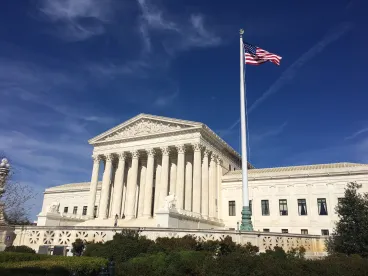Earlier today (May 22, 2017), the U.S. Supreme Court unanimously held that venue for patent infringement suits against U.S. companies is limited to the company’s state of incorporation or where the company has a “regular and established place of business.” The Supreme Court’s decision—TC Heartland LLC v. Kraft Foods Group Brands LLC, Case No. 16-341—dramatically reshapes the patent litigation landscape. For many years, venue has been deemed proper over a U.S. company wherever an accused product is found, providing plaintiffs with great flexibility in selecting a forum they perceived as favorable. The Eastern District of Texas has been the major beneficiary of that flexibility for many years; for example, according to legal analytics company Lex Machina, one-third of all patent infringement cases commenced in the First Quarter of 2017 were filed in E.D. Texas, a statistic that has been relatively stable for some time. Yet very few patent infringement defendants are incorporated within that district or otherwise have regular and established places of business there. TC Heartland will remove E.D. Tex. as a favored locale for patent infringement cases (particularly for non-practicing entities). As a result, expect to see new filings swell in other venues – particularly in the District of Delaware, where most large U.S. companies are incorporated.
(The paragraph above distills the case’s holding and impact on patent infringement litigation moving forward. For those interested in more details, read on.)
TC Heartland sought Supreme Court review contending that lower court practice was based on the U.S. Court of Appeals for the Federal Circuit’s misconstruction of the applicable venue statutes. The U.S. Code contains a special venue provision for patent infringement lawsuits (28 U.S.C. § 1400(b)), providing that “[a]ny civil action for patent infringement may be brought in the judicial district where the defendant resides, or where the defendant has committed acts of infringement and has a regular and established place of business.” Sixty years ago, the Supreme Court held in Fourco Glass Co. v. Transmirra Products Corp., 353 U.S. 222, 226 (1957), that a U.S. company “resides” only in its place of incorporation. In 1990, however, the Federal Circuit held that domestic companies could be sued for patent infringement in any U.S. judicial district where they were subject to personal jurisdiction. VE Holding Corp. v. Johnson Gas Appliance Co., 917 F.2d 1574 (Fed. Cir. 1990). The Federal Circuit’s holding stemmed from its view that 1988 amendments to the general venue statute (28 U.S.C. § 1391(c)) had modified the special patent venue statute to incorporate this broader concept of venue. In practice, VE Holding permitted plaintiffs to file patent infringement suits anywhere that infringing goods could be found after having been placed into “the stream of commerce,” meaning virtually anywhere. As a result, patent plaintiffs over time increasingly directed their cases to districts that they perceived as more favorable to patent litigation, with the Eastern District of Texas accounting for up to 40% of all patent infringement cases filed.
At oral argument, questions from the Supreme Court justices appeared to express some concern about the impact of an about-face on venue given 25+ years of practice since VE Holding. The Court’s resulting opinion, however, provides lower courts no guidance for how to turn the clock back to patent venue law circa 1957. In the short term, expect a deluge of venue transfer motions. Among the issues open for decision in such cases will be the scope of a “regular and established place of business” in a given district. That alternative, statutory basis for venue, which was rendered irrelevant while the Federal Circuit’s broad view of patent venue held sway, may itself become the basis for some amount of collateral litigation. Other practical issues include:
- how, with only two full-time judges (after Judge Robinson’s imminent retirement and Judge Sleet’s senior status), the District of Delaware will handle the likely influx of new and transferred cases;
- whether so-called patent assertion entities (PAEs), who regularly filed their cases in Texas, will reduce their activity because TC Heartland requires that they file infringement lawsuits in forums that are the defendants’ “home court”; and,
- how the business model for PAEs will be impacted, including whether the secondary market for patents will be injured by the ruling.
For more information on this case, please review our prior blogs on this matter (here, here, and here).






 />i
/>i

